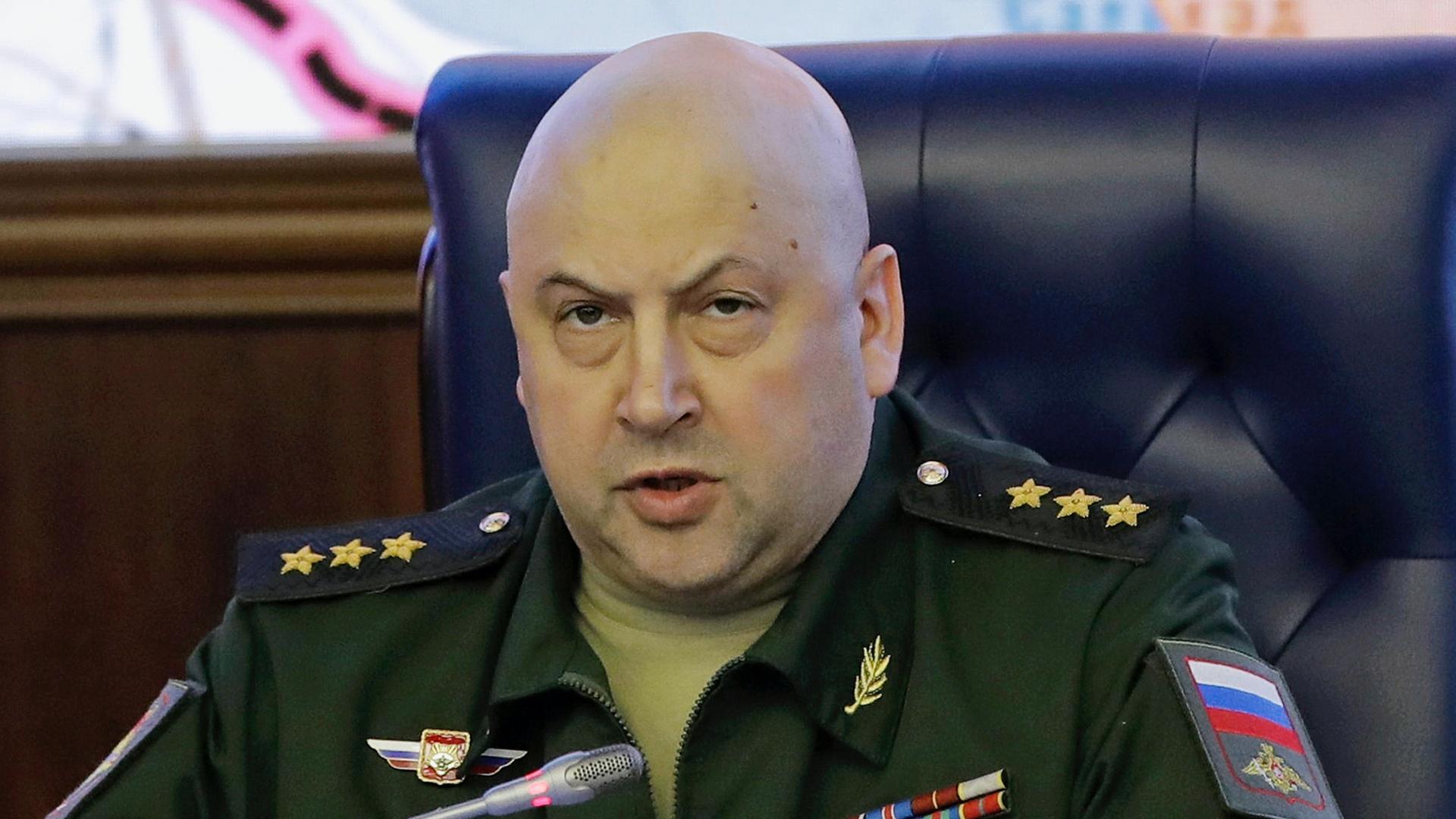Col. Gen. Sergei Surovikin, commander of the Russian forces in Syria, speaks, with a map of Syria projected on the screen in the back, at a briefing in the Russian Defense Ministry in Moscow, Russia, June 9, 2017. Russia’s Defense Ministry announced that air force chief, Gen. Sergei Surovikin, would be the commander of all Russian troops fighting in Ukraine. The statement marked the first official appointment of a single commander for the entire Russian force in Ukraine.
The word that’s most often used to describe Russian Gen. Sergei Surovikin is ruthless: His nickname is “General Armageddon.”
Some say that’s because of his hot temper, while others believe the nickname reflects his approach to war.
On Russian state media, Surovikin is praised for his years of military experience. He’s described as all-business — someone who gets the job done.
Surovikin has just been appointed to lead Russia’s war effort in Ukraine following a lot of turnover among the country’s top military commanders. Analysts say that the Kremlin never planned the war to last for many months, and many of its stated goals have not materialized. But despite the seasoned general’s reputation, some experts are skeptical about whether he can shift the war in Russia’s favor.
Irina Boragan, an expert on Russia’s security services, said that Surovikin already has a well-established record.
“He’s a professional army officer,” she said. “He’s 56 years old, and he started his military career during the Soviet times.”
During the war in Afghanistan, Surovikin served in a special forces unit. Later, during the final days of the Soviet Union, Surovikin was in the thick of things as Kremlin hard-liners tried to oust Mikhail Gorbachev.
When protesters took to the streets, Borogan said, Surovikin responded: “Surovikin was a young officer, and he commanded a rifle division and he ordered his soldiers to open fire on the protesters and as a result three men were killed.”
The officer spent a few months in prison, but that didn’t stop his rise up the ranks in Russia’s military. Surovikin later served in Chechnya, and he led Russian forces in Syria, eventually becoming commander of Russia’s air force.
“He became known as a very reckless and brutal commander because he launched a series of attacks against civilian infrastructure in Syria, and he became notorious for indiscriminate bombardment of civilians in this country.”
In 2020, Human Rights Watch listed Surovikin as a possible war criminal.
During that time, Gleb Irisov was an officer in the Russian air force. He said that he met Surovikin on multiple occasions and that the general was not well-liked.
“The majority of Russian air force officers used to be very disappointed with his personality,” he said.
Irisov said that Surovikin would lash out at subordinates and even resort to violence.
But, Surovikin is the kind of officer that the Kremlin can rely on, he said: “He seems to be very loyal directly to the highest Russian political power. Directly to president, to government, not to his chain of command, but directly to this political power.”
In 2017, Surovikin was awarded the “Hero of the Russian Federation” medal — Russia’s highest honor.
At a ceremony in Moscow that year, the general expressed his loyalty to President Vladimir Putin, saying, “We’re ready to execute your orders.”
Robert Hamilton is a retired US Army colonel and is now a research professor at the United States Army War College.
Hamilton was based in the Middle East and kept up communications with the Russian military operating in Syria, including Surovikin.
“We had daily interaction with the Russian headquarters in Syria, and I sat in on all the calls with Gen. Surovikin, so [I] got a little sense for him as a commander.”
So, what will Surovikin bring to the job as commander of Russian forces in Ukraine?
Just this week, Russia launched long-range missiles into Ukrainian city centers.
“Those types of attacks [are] because he oversaw those types of attacks in Syria. I don’t [think] there’ll be any institutional or personal break, or restraint if the Kremlin orders the targeting of civilians in Ukraine.”
That means more civilian casualties in the future. But Hamilton said that turning things around for the Russian military on the battlefield is another matter altogether.
“Having Surovikin in theater in charge may not be as big an advantage as it would normally be, because he may not have the authority to make the types of decisions that a normal theater commander would have to make, because I think, probably, he has to seek approval from the Kremlin to do things that in Western militaries, a theater commander would just have the authority to do on his or her own.”
Some experts say that Putin appears to be micromanaging Russia’s war in Ukraine.
As for Surovikin, his record shows that he’s not one to protest — he’s likely to keep following orders.
The World is an independent newsroom. We’re not funded by billionaires; instead, we rely on readers and listeners like you. As a listener, you’re a crucial part of our team and our global community. Your support is vital to running our nonprofit newsroom, and we can’t do this work without you. Will you support The World with a gift today? Donations made between now and Dec. 31 will be matched 1:1. Thanks for investing in our work!
